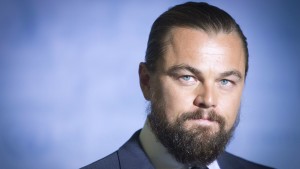Americans aren’t big on seafood. Worldwide, the average person eats about 44 pounds of fish and shellfish a year. A typical American eats roughly a third of that amount.
That’s a problem—both for our health and for the environment. High in nutrients and low in fat, fish are an excellent source of protein. They’re also more sustainable for the environment than livestock.
And so a burgeoning movement is underway to persuade Americans to stop turning up their noses at food with fins. Now the cause just got its highest-profile proponent: movie star, environmentalist and noted shark-attack-survivor Leonardo DiCaprio.
DiCaprio just announced that he’s investing in LoveTheWild, a US-based company that is repopulating grocery store freezer aisles across America with frozen, oven-ready seafood. We’re not talking fish sticks here. LoveTheWild’s selections involve a spectrum of intriguing sauces paired with flash-frozen fish (barramundi in mango sriracha chutney, for example, or catfish with cajun crème). Each takes about 20 minutes in the oven before they’re ready.
But the really remarkable thing here—and LoveTheWild’s boldest innovation—is the fish itself. One hundred percent of Love The Wild’s selection is aquaculture—meaning, it’s farmed.
This is a big deal because, however little Americans like to eat fish, they tend to be even leerier of seafood that’s farmed. But because we’ve basically hit ceiling on the global supply of wild-caught fish that can be harvested sustainably, the volume of those catches hasn’t really budged since the mid-1990s. If Americans are going to eat more fish, aquaculture will have to move in to fill the gaps.
“The exploitation of our oceans has left many marine ecosystems on the brink of total collapse, which is hurting our ability to harvest our seas as a reliable food source as we have for thousands of years,” said DiCaprio in a statement. LoveTheWild “is empowering people to take action on this crisis in a very meaningful way,” he added.
Many Americans still associate aquaculture with the horror stories of long ago: Fish hopped up on antibiotics because they’re packed into pens, eating each other’s own filth.
“When you ask people about farmed fish, they’re still talking about things that the industry solved maybe 20 or 30 years ago—that farmed fish aren’t healthy, they don’t taste good, their texture isn’t as good as wild fish,” says TJ Tate, director of seafood sustainability and education at the National Aquarium in Baltimore.
US consumers aren’t typically exposed to positive stories about aquaculture, says Tate. So they’re unaware that, as sustainability standards have risen, many farms have dramatically upgraded their methods to meet them, improving the quality of the fish they raise and minimizing their environmental impact.
The challenge now lies in finding a way to convince wary diners to take a bite. And that’s where LoveTheWild’s savvy marketing comes in.
“Their storytelling is really clear, transparent, and simple,” says Amy Novogratz, co-founder of Aqua-Spark, an investment fund focused on sustainable aquaculture businesses. She praises LoveTheWild for using social media and back-of-the-box packaging to introduce consumers to fish farmers and their process, helping Americans to understand—and giving them confidence in—where their food comes from. “And at the end of the day, they have verifiably great tasting fish.”
In Dec. 2016, Aqua-Spark invested $2.5 million in LoveTheWild, with the aim of helping it expand from the 600 stores its products currently sell in to 6,000 stores within five years. It was the fund’s first consumer-side investment.
Coming on the heels of Aqua-Spark’s investment, DiCaprio’s announcement is another big vote of confidence in the future of farmed fish. The actor has a special relationship with the ocean—and we’re not just talking about his close call with a great white. (While he was diving in South Africa, one thrust itself into his cage—as DiCaprio described it, “half its body was in the cage, and it was snapping at me.”) Last year, he helped launched a project to counter illegal fishing. Today’s investment puts DiCaprio at the forefront of promoting an industry that is the key to maintaining ocean health—and human health too.

